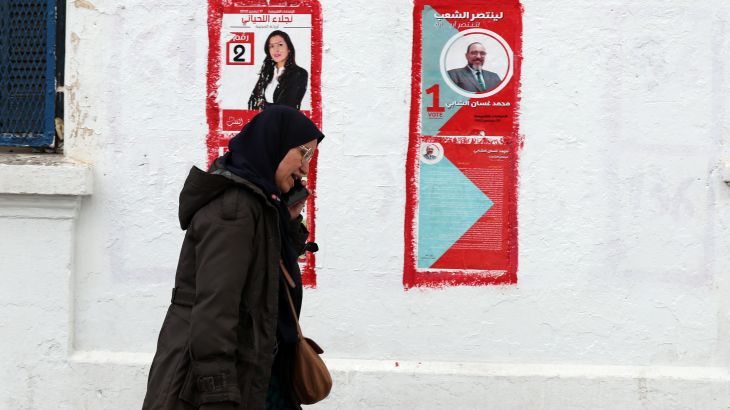Tunisians trickle in to vote in elections as opposition boycotts
President Saied’s rule changes have been met with anger from the opposition and apathy from much of the public.

Tunis, Tunisia – Polls have opened in Tunisia for parliamentary elections marked by a general sense of apathy among much of the population.
Some 9.3 million registered voters are eligible to cast their ballot in Saturday’s elections, but the field of parliamentary candidates is much smaller than usual, with some constituencies only having one candidate who will automatically be declared the winner.
Keep reading
list of 4 itemsAs elections approach, Tunisian market shelves are still bare
Ex-Tunisian president warns of ‘Arab volcano’ ahead of elections
Will Tunisia’s political crisis ever end?
More than 1,000 candidates will be running in this year’s elections, compared with 15,500 in 2019.
Tunisia’s electoral system has significantly changed after a new constitution was introduced by President Kais Saied, and it is much criticised by the country’s opposition, the majority of whom are boycotting the elections.
The new constitution was voted on in a referendum on July 25 this year. It was passed, but only 30 percent of registered voters took part.
The document consolidates legislative, executive and judicial powers in the hands of the president, making parliament beholden to him.
The opposition argues these changes have moved Tunisia away from the gains of the 2011 revolution, which overthrew former longtime leader Zine El Abidine Ben Ali.
Political parties can no longer run campaigns or fund candidates. Under the new rules, all candidates must run as individuals and fund campaigns themselves, whereas previously Tunisia’s parliamentary elections were based on a proportional representation list system, and the state provided funds to give a broader scope of candidates a chance to run for office.
Twelve political parties, including the Muslim Democratic Ennahdha and the centrist Qalb Tounes, which together held the largest bloc in the old parliament, have declared they are boycotting the election entirely.
The powerful labour union UGTT also said it rejected the election process entirely.
Human Rights groups have decried the new system, arguing women are losing out with only 122 female candidates running, compared with 936 men.
One of the few people at a polling station in Tunis said that she was voting to support Saied. “I want to support my country and to support my president. I want the country to go forward and get better and that’s why I voted today,” said local businesswoman Manoubia Shagawi.
Russian observers
The European Union has said it will not observe the ballot, while leading Tunisian election observer, Mourakiboun, which has monitored all post-revolution elections, will only carry out random data sampling, as opposed to the detailed monitoring it previously conducted.
However, Farouk Bouasker, the president of the official election commission, the ISIE, has publicly welcomed observers from the African Union and the Civil Chamber of the Russian Federation in the run-up to the vote.
On Friday, Bouasker said the presence of the Russian observers was evidence of the “privileged relations between Tunisia and Russia”.
Voting will end at 6pm local time (17:00 GMT), but confusion reigns over when election results will actually be published.
The ISIE said preliminary results could come early next week, and a second round of voting is also expected in some constituencies.